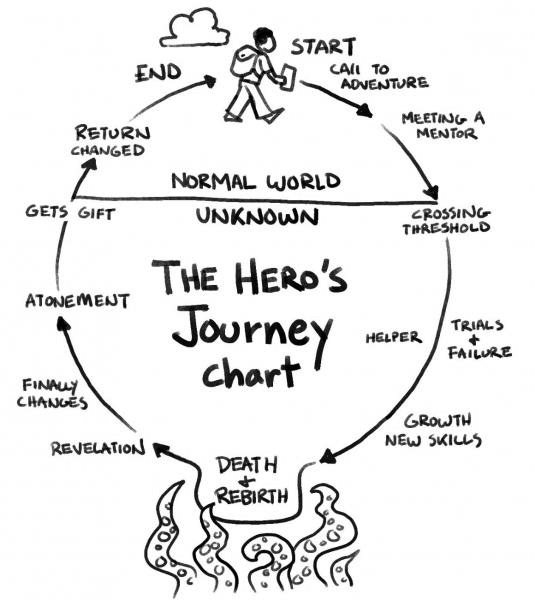The hero's journey of telling stories
Yes, there will be death. There will be rebirth.
Wow, two newsletters in two weeks! I’m like that old friend who ghosted you for months and is now coming for you with Things. To. Share.
This week I spoke to recipients of the Jesse Cox Audio fellowship, an amazing opportunity for emerging storytellers to be mentored to make long-form narrative audio documentaries. Jesse was a friend, colleague and master of the craft, so I’m so glad the fellowship has landed at All the Best, the incubator for narrative audio storytelling in Australia.
I gave the opening workshop for the fellows and was supposed to be kind of like the hype guy for the storytelling process. Instead, I showed them this visual representation of the narrative structure The Hero’s Journey:

My theory is this, I told them:
The Hero’s Journey is available to us care of Joseph Campbell, the mythologist who analysed and synthesised many, many human stories and myths over time, into this narrative framework.
We appreciate this structure as storytellers not because we want our stories to be tropes or archetypes or cliches, but because Campbell understood that the millennia of stories created by humans tended to have something in common.
And I don’t have millennia of years’ experience in telling stories, but I’ve gathered enough now that I can tell you that story-making often follows its own trajectory— in that there is a universal story structure to the actual experience of documentary-making that I think replicates the narrative trajectory of so many stories we love ourselves.
And by now I know you’ve clocked the firey (or tentacle-y?) pits of death and rebirth. Seasoned documentary makers nod their heads.
It all starts out so well: There’s a call to adventure— a hunch, a desire, a drive to pursue this as your vocation and destiny. To reveal truths hidden in our over-saturated world. Or at least, a way more interesting occupation than most other jobs on offer in late-stage apocalyptic capitalism.
You connect with a mentor — note: vital no matter how experienced you are. A mentor can be a peer.
Then of course you cross a threshold, you enter the world you’ve committed to explore and portray. There are trials and failures of the minor kind, and crucially, helpers. Helpers are shape-shifters, they appear in all kinds of forms. As a documentary-maker you have to keep your eyes open to them— to the kind of interviewees or advice givers who might help your story twist in a direction you hadn’t anticipated. What’s crucial is to not close off your story too early— to direct yourself into a dead end. You should say yes a lot in your early gathering process.
There’s growth, new skills, a sudden blaze of self-assurance. Maybe you’re just like… a natural interviewer?! Who connects to people and reveals truths to all? Maybe you’re just like… oh wait,
TOTAL CATACLYSMIC DEATH.
I can tell you at least ten different ways I have story-died during a project, when the core of the work and the world seemed to fall from under me, and all hope was lost. It is never completely lost.
But it leads to the part of the work where you gain the knowledge you could never have gained if you hadn’t gone through that hell: the revelations, the atonements, the knowledge of what you’ll do differently next time.
You return changed — transformed. You’ll read your scars like a compass and you’re already, almost involuntarily, percolating new stories in your head.
Anyway, pin this to your wall if it’s useful, pass it on to a newbie. This is the luck and the absolute curse of wanting to be a part of sharing complex, multidimensional stories, but at least, we can remind ourselves, it’s been done before, and there’s something of a map for it.

